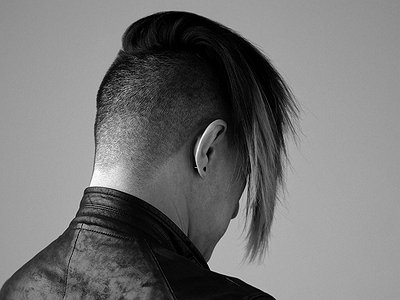Part 2
Within a digital working environment, it is possible to compile huge archives of ideas for later use. Tell me a bit about your strategies of building such an archive and how you put these ideas and sketches to use.
I'm a bit more of a project to project kinda person. It’s rare for me to just go into the studio to create ideas or to have an idea sesh just to create a bunch of semi finished ideas. I know there’s loads of artists out there who do this, but for me once I get an idea down, I have to try and get it the next step in the process.
I've learned over the years that its always the projects that take weeks or months or years to finish are not always the best tracks compared to the ones that I finish within a few days. Don’t get me wrong, I have loads of half finished ideas and projects, but that’s just it, they aren’t finished. It's hard for me to want to go back to them because I’m always on to the next thing.
I do however love to sample and sound design as much as I can for my projects. I do this outside of the studio setting and will often bring a synth or drum machine or piece of analog gear out of the studio and post up in the living room, coffee shop, or even outdoors with my laptop and just record cool sound effects or design some crazy synth patches and record those elements to use in my tracks. But again it’s usually when I need something specific for a project I'm already working on.
Despite the aforementioned near endless possibilities, many productions seem to follow conventional paths. How do you retain an element of surprise for your own work – are there technologies which are particularly useful in this regard?
I’m a huge fan of drums and creating percussion patterns in my records. I find the Maschine comes into play here heavily as I often skip using the pads and sequencer alltogether and just record live drumming on the pads of using the “repeat” looping function to create snare rolls and interesting high hat and percussion patterns etc. I have Maschine MK3 routed to a separate audio channel within Ableton and I’ll just press record and as my track is playing along I record these patterns, improvising live into the audio track. From there I further chop and process them outside of Maschine within Ableton. This helps me create really dope patterns that I might have never even thought of using the mouse just clicking the midi notes in.
I use the arpeggiator in a very similar fashion and really love playing around with the settings within the plugin. You would be surprised at the amount of unpredictability you can create with some of these third party arpeggiators that aren’t built into the synths directly, even the stock Ableton arp is my go to for this specific element of surprise factor your asking about.
Production tools can already suggest compositional ideas on their own. How much of your music is based on concepts and ideas you had before entering the studio, how much of it is triggered by equipment, software and apps?
Having a classical music background, I’m always keeping music theory basics in my head while going through the production process. I think personally this part of music production has been getting a little watered down, especially in Techno. As much as underground and Techno tries to break boundaries and not follow traditional ideas and music theory, personally I feel an obligation as a musician to stick to certain ideas and rules when it comes to this side of things.
However, since it is Techno we do break the rules from time to time and I feel this is where my analog gear, software and apps help me to think outside of the box and traditional/conventional music ideas and concepts.
How important is it for you that you personally create or participate in the creation of every element of a piece – from sound synthesis via rhythm programming to mixing?
Great question and I’m glad you asked this.
Personally I’m very critical and obsessive when it comes to my music. Growing up I’ve always been fascinated with the traditional studio work flow and culture. Prince, Michael Jackson, Rolling Stones, Wu-Tang Clan, Tribe Called Quest etc have all been major influences for me outside of dance music. Every single one of these artists create bodies of music that involve so many people in every process.
Originally what drew me to dance music production was partly the idea of being a one man band, but over the years I started to become more and more self conscious of my work as I started to get better and better. It wasn’t until I started to let go of some of this control and realize working with others who specialize in certain parts of the process only results in a better end result.
As much as I love the mixing and mastering process, I’ve realized I can’t be great at everything, and working with people who only focus on that part is going to far exceed anything I can do when it comes to that side of things. Early on I spent many years learning and trying to gain as much knowledge about these processes only to realize the professionals not only have better equipment, but years of experience and knowledge that I would never be able to reach while focusing on DJing and being creative.
I also think its important to get feedback from your friends and industry peers. I always send my tracks to friends to get opinions and any additional advice that could make my tracks that much better. Sometimes I’ll get arrangement ideas, additional processing and fx ideas etc. The more ears on each track I get the better I feel about the end result.
Have there been technologies which have profoundly changed or even questioned the way you make music?
This is a weekly struggle. (laughs) It’s almost every week something new pops up, some new technology, plugin, piece of gear etc that’s there to help make things easier and quicker. There’s a part of me that wants to resist it, but I know in the end it's all there to help us achieve the end goal.
I think every piece of gear I have in the studio that I’ve collected over the years has changed the way I make my music. The key is not getting addicted to collecting too many pieces of gear that it distracts you.
To some, the advent of AI and 'intelligent' composing tools offers potential for machines to contribute to the creative process. Do you feel as though technology can develop a form of creativity itself? Is there possibly a sense of co-authorship between yourself and your tools?
Yes and no … I’ve already been exposed to some of this AI you speak of, and honestly it's a bit shocking. The possibilities are both good and bad. In one had you have the ideas that eventually this could totally abolish the human musician all together, while on the other hand I feel like the human element is something a computer can never duplicate no matter how good the AI.
It’s more about the human behind the machine for me, and that’s where the co-authorship comes to play. It’s always going to need a bit of human element to help give it that human touch. Computers are always going to be yes and no … black or white ... zeros and ones. No matter how good the AI, there’s still a human feeding it information. Until as humans we give full unlimited access and control to the AI, we will never fully see what it’s capable of.
Humans are not ready - and I’m not sure if we will ever be ready - to give the machines full control. At least not yet.
Do you personally see a potential for deeper forms of Artifical Intelligence in your music?
I do, don’t get me wrong, I think AI has its place. Most of the production process is very repetitive and routine. If AI can help with these parts of the production and almost predict that I want to use this EQ on this track, load this effect on the drums, etc ... that’s only going to help me create more music and be more creative and output more music in the end. It’s up to me to make sure its up to par to everything else I’ve put out.
What tools/instruments do you feel could have a deeper impact on creativity but need to still be invented or developed?
That’s a really tough question, especially these days when pretty much everything is available to us for pretty much every part of the production process.
I think virtual collaborations still need to be refined. With the further development and current state of VR, I could see us virtually creating music in a virtual studio in the meta. But to achieve the quality and real time work flow in a virtual world like that depends on our infrastructure and available technology for the average producer.
I'm also following this huge NFT hype that’s been going on. I’m still not 100% onboard yet, but at the same time I think its going to be a crucial element to the future and music. Not exactly sure how yet, and I know loads of people have ideas and predictions and some are even already implementing it in some sort of music offering, but the over all blockchain and that part of the tech is going to be part of the future of music in some way.
Personally I don’t think it’s going to be how people are thinking it’s going currently with music and visuals/video and 3D spinning objects. It might be something more aligned with an actual piece of hardware kinda like Ye’s Stem player or something like an iPod or something that’s attached to the blockchain rather than a digital NFT of sorts.






